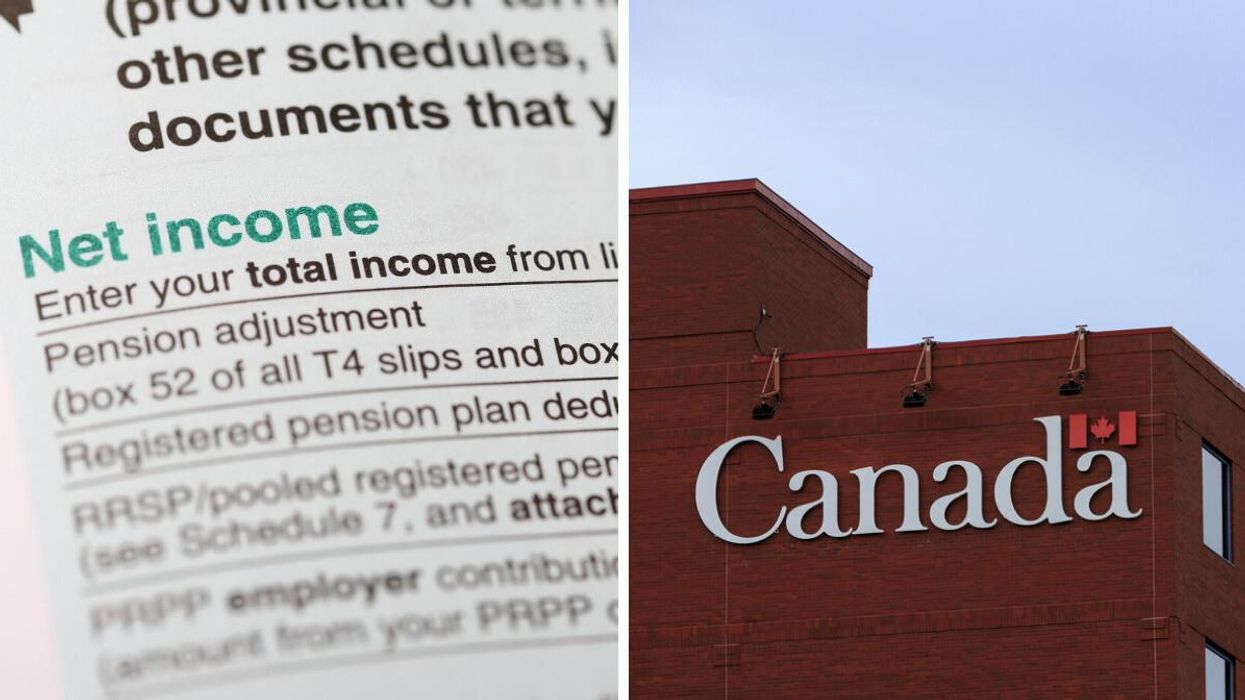7 Tax Credits & Expenses You Can Claim In 2023 That Could Save You Money When Filing
Get more money at tax time.💰

A tax return. Right: A government of Canada building.
Tax season is just around the corner in Canada, and there are a bunch of tax credits and benefits to claim in 2023 that could help you save money when filing.
According to the Canada Revenue Agency (CRA), Canadians may qualify for a whole bunch of tax benefits out there depending, of course, on their situation.
Whether you or someone you care for has a disability, or you are making a modest or low income, there are plenty of ways to save money on your tax return.
So, before that May 1 tax deadline comes any closer, here are some essential credits and benefits that every Canadian should be privy to, no matter your tax bracket.
Climate Action Incentive Payment (CAIP)
The Climate Action Incentive Payment is a tax-free quarterly payment given to Canadians to offset the impact of federal pollution pricing.
You are automatically signed up for this one when you file your taxes, so it's an added incentive to get your taxes done.
You can get the CAIP if you're 19 or older and living in Alberta, Ontario, Saskatchewan or Manitoba, with those who live in small or rural communities getting an additional supplement.
In order to be eligible under the age of 19, you need to have (or have had) a spouse or common-law partner or be a parent living (or previously living) with a child.
And, if you live in Newfoundland and Labrador, Nova Scotia or P.E.I., you'll see the CAIP soon. Payments in these three provinces are set to roll out starting July 1, 2023.
Canada Workers Benefit (CWB)
The CWB is a refundable tax credit that aims to make living easier for individuals and families earning a low income in Canada.
You are eligible for this benefit if you're 19 years of age or older, you have a working income that is under the threshold, you're a resident of Canada and a few other factors.
There is also an additional disability supplement for those who qualify.
Find out more
Child Disability Benefit (CDB)
This tax-free monthly payment is for individuals or families taking care of a child under the age of 18 who has a "severe and prolonged impairment in physical or mental functions."
This is a benefit given out by the CRA and is actually not limited to tax time specifically. According to the site, you can send in an application form for this at any time during the year.
If you do qualify, you can get up to nearly $3,000 a year ($248.75 per month) to help with caregiving expenses.
Home Accessibility tax credit
This credit is for anyone who has had to make changes to make their home more accessible and/or functional for themselves or another qualifying individual.
With this credit, you can claim building materials, permits, equipment rentals and professional work up to $20,000 against your income.
There are a bunch of rules, though, so be sure to read up on them before you apply.
Canada Training Credit (CTC)
This is another great credit that is perfect for anyone who got additional education or training during the tax year you're filing for.
With this, you can claim your tuition plus other fees related to taking courses.
However, there is a catch. You can only apply for this one if you are between the ages of 26 and 66 at the end of the applicable tax year.
Disability Tax Credit (DTC)
For those who have a disability in Canada, this is a helpful resource. You can apply for this non-refundable tax credit if you or a person you're supporting has an eligible "severe and prolonged impairment."
Once the CRA reviews and approves the application, eligible individuals can claim the DTC — designed to offset the costs related to a disability — on their income tax return.
What's more, if you don't need to claim the entire disability amount on your tax return, the remainder can be transferred to a "supporting family member."
Canada Caregiver Credit (CCC)
This credit is for any Canadians who might be taking care of a spouse, common-law partner or dependent with a physical or mental impairment.
This tax credit, which you can claim on your tax return, is to help those who have people relying on them for basic needs such as food, shelter and clothing.
You can claim up to $7,525, depending on your situation and income, so be sure to have all the required documentation ready if you're applying.
And, if you're looking for help filing your 2022 taxes, look no further. Narcity recently spoke with a tax expert to get a better understanding of how to help yourself get the biggest return possible.
His advice included getting your receipts and documents in order, donating to charity at a specific time and more.
Plus, knowing what tax bracket you're in for 2022 will also do a lot to help you plan your tax return.
- Canada's New Tax Brackets For 2023 Are Out & This Is How Much You'll Be Forking Out ›
- Here's How To Set Yourself Up For A Bigger Tax Return In 2023, According To An Expert ›
- 7 Ways Students In Canada Can Save Money At Tax Time, According To The CRA ›
- 9 Big Changes The CRA Wants You To Know About That Could Impact Your 2022 Taxes - Narcity ›
- 8 Credits, Rebates & Grants Canadian Homeowners Can Claim On Their Taxes - Narcity ›